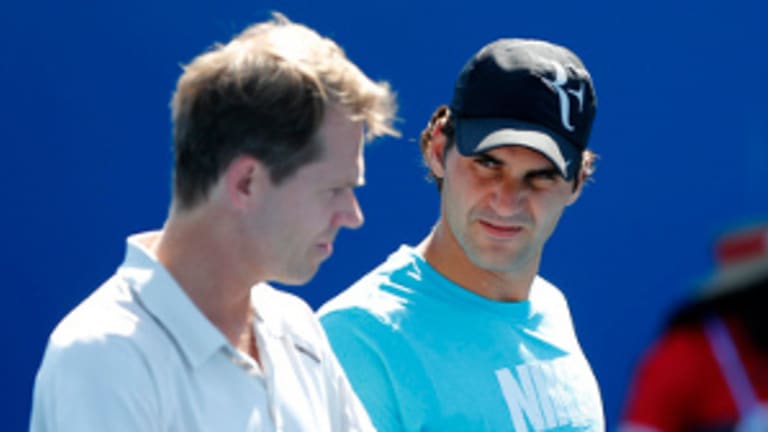MELBOURNE—The novelist Graham Greene lived a life filled with more than its share of pain and ugliness, but he tried to leave all of that behind with his final book, which he insisted be published after his death. It was called A World of My Own: A Dream Diary. Over his last 25 years, Greene would regularly summarize what he could remember of his dreams when he woke up; this was a selection of those summaries. In the final entry, the octogenarian’s sleeping self returns to his Edwardian childhood and takes an enchanted train journey through the England of his youth. “I had never felt such a sensation of happiness,” Greene wrote.
As strange as it may sound, Greene’s late-life leap back to innocence has popped into my head whenever I’ve heard Roger Federer speak at this year’s Australian Open. No, Federer is not anywhere close to 80 years old. And while one of his Rolex commercials suggests that he mainly dreams of himself playing tennis in a suit, according to an article by Doug Robson in USA Today yesterday, Federer doesn’t actually remember what goes through his head when he's asleep.
Yet during this first week in Melbourne, Federer has sounded like a man looking back to his youth, in the hopes of fulfilling one more childhood dream: To hang out with his idol, Stefan Edberg, and perhaps to play the kind of Edbergian tennis that he had once believed he would play.
“It’s fascinating how he went through his career, how things were back in the day,” Federer said of Edberg as the tournament began. “Especially his days, those were the times I remember from TV. That’s kind of what’s very exciting, just hanging out with him. That was the idea as well. If it didn’t work out, he would say, ‘I’m not ready for this,’ at least I would have had a few nice dinners with him and be able to spend time with a childhood hero, which would be plenty to fuel my motivation.”
During his first match here, Federer even broke his personal rule against looking up to his player’s box so he could catch a glimpse of Edberg.
“I realized after a set I didn’t look up once yet,” Federer joked. “I better check if he’s actually there. I did see him. He was wearing sunglasses. OK, he is there.”
I don't know whether Edberg will help Federer improve; neither of them do either. According to the Tennis Space, Edberg was warned by his former coach Tony Pickard that it’s hard to get an old dog in to do new tricks in tennis—hard, in other words, to make someone who is already a champion into an even better player. Edberg has never coached another pro, and he hasn’t seen many of today’s players live. But even with those caveats, I can see why, from a tactical and psychological perspective, this student would choose this mentor. Two areas where Federer has struggled, his return and his net game, are two areas where Edberg excelled. I’ve always thought that Federer could benefit from a tutorial on volleying given by Pat Rafter, on how to use your legs as well as your hands up there—on how to stalk the net. But Edberg, another legendary net-stalker, should do nicely in that department.
Whatever happens with his results, I like Federer’s choice of Edberg because of its spontaneity, and because it isn’t strictly a logical or practical decision. The genesis of their partnership happened serendipitously, when the two men met at the ATP’s gala gathering of former No. 1 players last fall in New York. They stayed and talked after all of the other players had left.
“I’ve had the chance to play with Stefan once in Stockholm,” Federer toldThe Age last week, “and just spend some time with him but not very much, so here he was in New York, all happy and relaxed, and we just chatted for a while. So then, when I parted ways with Paul Annacone, I thought...”
Federer, proud champion that he is, wouldn’t admit that he actually needed anyone new in his corner. “But if we could add something to the team,” he said, “it could be something like an inspiring person, and Stefan definitely fills that role very well.”
In the past, Federer has been criticized for being "stubborn.” Fans have complained that he wouldn’t adjust his game to beat Rafael Nadal; that he spent too long at one stage without a coach, trying to prove he could win on his own; that he wouldn’t get with the times and try a bigger racquet. Even Federer’s parents have said they think he can take too long to make decisions. This time, Federer, with virtually all of his professional goals accomplished, went with his gut and his heart, and went with what felt exciting to him. For those reasons alone, I’d like to see Fedberg find success.
